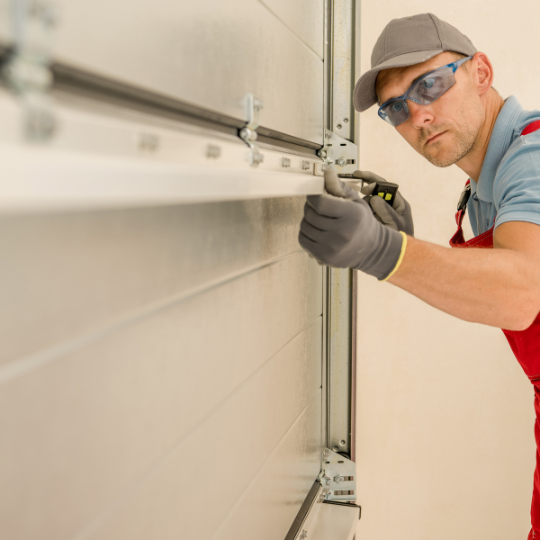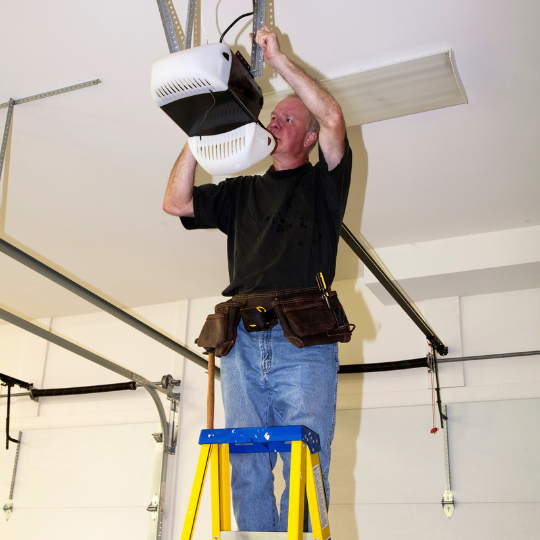Garage door openers are among the most critical components of your garage door system, often taken for granted until something goes wrong. When they fail, it can disrupt your daily routine and potentially pose safety issues. In this blog post, we’ll delve into the common reasons behind garage door opener failures, how you can diagnose these issues, and what steps you can take to fix or prevent them.
Garage door openers are like the unsung heroes of your home’s entryway. They come in various types, including chain drive, belt drive, and screw drive, each with its unique mechanism and benefits. Regardless of the type, these openers have one primary function: to lift and lower the garage door with ease.
The opener works by using a motor to drive a mechanism that moves the door along its tracks. This might sound straightforward, but there are many moving parts involved, and each one has the potential to cause problems if not properly maintained.
Table of Contents
Common Causes of Opener Failures

Understanding why garage door openers fail can help you troubleshoot the problem before calling in a professional. Here are some common issues:
Power Supply Problems
One of the most basic yet frequently overlooked issues is the power supply. If your opener isn’t working, the first thing to check is whether it’s receiving power.
- Unplugged or Loose Cords: Ensure that the opener is plugged in securely and that the power cord isn’t damaged. Sometimes, a loose connection can be the culprit.
- Tripped Circuit Breaker: Check your circuit breaker to see if it has tripped. If it has, resetting it might solve the issue.
Remote Control Issues
Remote controls can fail for several reasons, and they’re often the first thing people check when their garage door isn’t working.
- Dead Batteries: The simplest explanation might be that the batteries in your remote control are dead. Replace them and see if that resolves the issue.
- Interference: Sometimes, other electronic devices can interfere with your remote’s signal. Try moving any such devices away from the opener to see if it improves performance.
Sensor Problems
Garage door openers are equipped with safety sensors that detect obstructions in the door’s path. If these sensors are misaligned or dirty, they can prevent the door from closing properly.
- Misalignment: Check if the sensors are aligned properly. They should face each other directly, and the lights on each sensor should be on and steady.
- Dirt and Debris: Clean the sensors with a soft cloth to ensure that dirt or spider webs aren’t blocking their signal.
Broken Springs
Garage doors rely on springs to help them move up and down. If these springs break or become worn out, it can cause the opener to struggle or fail entirely.
- Visual Inspection: Look for any visible signs of damage or wear on the springs. If you notice any issues, it’s best to call a professional for repairs, as handling springs can be dangerous.
Gear and Sprocket Issues
Inside the opener, gears and sprockets work together to move the door. If these parts become worn out or damaged, the opener might not function correctly.
- Noise: If you hear grinding or other unusual noises coming from the opener, it could be a sign of gear or sprocket problems.
- Inspection and Lubrication: Regularly inspect and lubricate these parts to prevent wear and tear.
Motor Issues
The motor is the heart of your garage door opener. If the motor fails, the entire system can come to a halt.
- Overheating: Motors can overheat if they’re overworked or if there’s a mechanical issue. Ensure the motor is adequately ventilated and not blocked by debris.
- Malfunction: If the motor isn’t working even after addressing other potential issues, it might need professional attention or replacement.
Diagnosing Opener Problems
Check the Power Source
First, ensure the opener is plugged in securely and receiving power. Test the outlet with another device to confirm it’s functional. If the outlet is working, check the circuit breaker. If it’s tripped, resetting it might restore power to the opener.
Test the Remote Control
Replace the batteries in your remote control, as dead batteries are a common issue. If the opener still doesn’t respond, use the wall-mounted button to see if the problem is with the remote or the opener itself. This will help isolate the issue.
Inspect the Sensors
Examine the sensors on either side of the garage door. Ensure they are aligned properly and free of dirt or obstructions. Each sensor should have a steady light. If the lights are off or flickering, realign or clean the sensors as needed to ensure proper functioning.
Examine the Springs and Tracks
Inspect the springs and tracks for visible damage or wear. Broken springs or bent tracks can prevent the door from operating smoothly. If you notice any issues, refrain from using the door until it’s repaired to avoid further damage or safety risks.
Listen for Unusual Noises
Observe the sounds coming from the opener during operation. Grinding, clunking, or other unusual noises can signal problems with internal gears or the motor. Pay close attention to these sounds, as they can indicate mechanical issues needing professional attention.
Assess the Motor
If the previous steps haven’t resolved the issue, the motor might be at fault. Look for signs of overheating, such as excessive heat or a burning smell. If the motor seems malfunctioning or unresponsive, it may require professional evaluation or replacement.
Preventative Maintenance Tips
Preventing garage door opener issues is often easier and less expensive than fixing them. Here are some maintenance tips to keep your opener running smoothly:
Regular Lubrication
Lubricate all moving parts of your garage door opener, including the chain or belt, gears, and springs, to ensure smooth operation. Use a silicone-based lubricant to avoid attracting dust and debris. Regular lubrication helps reduce friction and prolongs the life of these components.
Periodic Inspections
Conduct regular inspections of your garage door system to identify any signs of wear or damage early on. Check for issues such as frayed cables, worn-out rollers, or bent tracks. Addressing minor problems before they escalate can save you from costly repairs and ensure safe operation.
Clean the Sensors
Keep the safety sensors on either side of the garage door clean and free from obstructions. Wipe them down with a soft cloth to remove dirt and debris that can interfere with their functionality. Clean sensors help ensure that the door operates smoothly and safely.
Check the Balance
Ensure your garage door is properly balanced by disconnecting the opener and manually lifting the door halfway. It should stay in place without moving. An unbalanced door can put extra strain on the opener, leading to premature wear and potential failure.
Professional Servicing
Schedule annual maintenance with a professional technician to inspect and service your garage door system. A technician can perform thorough checks, make necessary adjustments, and address any underlying issues that you might miss. Regular professional servicing ensures your opener remains in top condition.
When to Call a Professional
While many garage door opener issues can be tackled with DIY solutions, there are times when calling a professional is the best course of action. If you’re uncertain about the problem’s cause or how to address it, or if the issue involves complex components like the opener motor, it’s wise to seek expert help. Professional technicians have the tools and knowledge needed for accurate diagnosis and effective repairs.
Additionally, if you feel uncomfortable dealing with intricate repairs, especially those involving springs or electrical elements, it’s safer to hire a professional. Their expertise ensures that repairs are done correctly and that your garage door system functions safely and efficiently.
Conclusion
Understanding garage door opener failures is crucial for maintaining a functional and safe garage door system. Checking the power source, remote control, and sensors, as well as listening for unusual noises, can help address issues early and prevent costly repairs. Regular maintenance, including lubrication and inspections, plays a key role in avoiding unexpected problems. However, for complex issues or if there is uncertainty about handling repairs, seeking professional help is advisable. For expert service and repairs in Youngstown, Ohio, contact Brand Garage Doors, LLC at (330) 240-6369 for reliable and efficient solutions to all garage door needs.


0 Comments